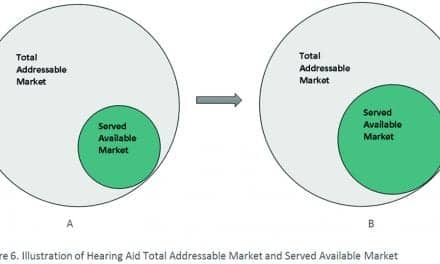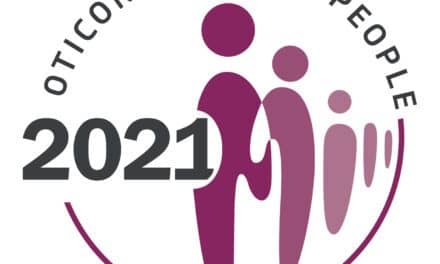The 2018 Academy of Doctors of Audiology (ADA) Convention had the theme, “Bolder than Ever,” and lived up to it with 3 days of excellent seminars and events in Orlando, Fla, on October 22-24. Three topics appeared to dominate discussions and presentations at the convention: 1) Hearing healthcare and its role in general health; 2) OTC and self-fitting hearing aids and how a hearing care practice should be responding to these changes; and 3) the Audiology Patient Choice Act (APCA).
Special symposium. For the first time ever, ADA held a symposium dedicated to a special topic on the first day of the convention. “Managing the Co-Morbid Patient” was an all-day educational event led by symposium chair Victor Bray, PhD, of Salus University. The 6-hour symposium brought together leading experts to discuss common co-morbid diseases and chronic conditions encountered by hearing care professionals. Dr Bray provided an overview of comorbidities and laid the groundwork for why audiologists will become increasingly important in general healthcare. Presenters in the symposium included David Zapala, PhD (Documenting and Communicating with Physicians/Audiovestibular Comorbidities); Nicolas Reed, AuD (Brain/Neurologic), Michelle McElhannon (Oncology/Otoxicity), Richard Gans, PhD (Kidney Failure/Dialysis Effects on Balance), Christopher Spankovich, PhD (Pancreas and Diabetes), and Carol Knightly, AuD (Cardiopulmonary).
The symposium will be featured in an upcoming special edition of ADA’s journal, Audiology Practices. Earlier this year, Dr Bray created a Hearing Review webinar on the subject of hearing loss and depression, and a 2017 webinar by Harvey Abrams, PhD, on the subject of hearing loss and comorbidities was also sponsored by Hamilton CapTel.
OTC and self-fitting hearing aids. With the FDA’s recent announcement of a new class of self-fitting hearing aids and its continued development of standards for an OTC hearing device category, a lot of talk at the convention centered on how audiologists and their practices should adapt to the changing market. In general, the overarching viewpoint in seminars and presentations was that hearing-related businesses should unbundle products from services, embrace all kinds of hearing solutions, become more patient centered, and look for ways to adapt and diversify in the face of change with services for tinnitus, balance, cochlear implants, and more, when appropriate.

Christopher Schweitzer, PhD, explains new possibilities in professional care for those consumers who have purchased hearables.
For example, in a seminar titled, “Positioning Professional Care Value Through Innovative Practice Strategies,” David Smriga, MA, Gregory Frazer, AuD, and Dale Thorstad advocated for using verification as a counseling and goal-setting tool, examined an insurance-based practice model, and looked at technology selection strategies and charging for clinical services for PSAP and OTC consumers. Christopher Schweitzer, PhD, in his seminar “Expanding the Patient Journey (and the Practice) with Hearables,” looked at the “fires” going on in today’s hearing healthcare market and posed the question “If I don’t have an OTC strategy, will one be thrust upon me?” He reviewed several possible solutions which he jokingly likened to “fixing a $5 haircut,” and also provided information about the Clementine and Samplified Audio technologies which have the potential to provide an overall programming platform for hearables. In a presentation titled, “Practice Trends: Hearing Health Care or Consumer Electronics?”, Amyn Amlani, PhD, examined the literature on health behavior models and the consumer decision model, and provided recommendations for broadening and better defining service and technology offerings.

A panel led by Craig Castelli, featuring Elizabeth Rogers, AuD, William Diles, MA, Brain Vesely, AuD, and John Hartman, MA, provided perspectives on what the future holds for practice ownership.
APCA. A members-only Town Hall was held on Tuesday evening to discuss the Audiology Patient Choice Act. Closed to the press, stakeholder input was sought on APCA and ADA’s 18×18 initiative which had 2018 as the finish line. The member’s meeting of this year’s American Academy of Audiology (AAA) brought considerable controversy surrounding APCA, and ADA has been a strong proponent of the bill and for Audiology becoming an LLP-based profession. Readers are referred to the ADA members website for more information.
At the ADA General Assembly, Academy President Alicia Spoor, AuD, provided a personal and emotional perspective on how ADA had changed her career as a student and then through the organization’s support, expert systems and mentoring, and advocacy as she endeavored to build her ideal “fairy tale practice” that she now owns and characterizes as a “disrupter” in her market. “Over the past years, ADA has had the best interests of the patient, the profession, and private practice in mind, and will continue to be there for me and for you in the future,” said Spoor. “With your ongoing support at each level [of professional development], ADA can and will continue to support the entrepreneur in all of us—from those who want to empower our seniors, to the ones who work in pediatrics, to those instructors in academia, to those who want to take the scary but extremely rewarding level of practice ownership.”
President Spoor also presented the Academy’s Awards. The Leo Doerfler Award was given to Jacque Scholl, AuD, of the Scholl Center in Tulsa, Okla, for what Spoor characterized as being “5-10 years ahead of her time” in audiology. Scholl—who also presented an exceptionally engaging 3-part seminar at the conference titled “OTC Hunting”—has developed a unique clinic that incorporates a wide range of products and services, including a separate business for hearables and services ranging from tinnitus to cochlear implants.
Amyn Amlani, PhD, was honored with the Joel Wernick Award for his research and educational dissemination on economics and hearing healthcare. Dr Amlani’s contributions envelop a wide range of topics, including the plasticity of hearing aid pricing, the efficacy of software-driven hearing devices, and the benefits of real-ear measurement in terms of customer loyalty and retention.
The Craig Johnson Award was presented to ADA past-president Rita Chaiken, AuD, for her work in state and national advocacy for audiology services. Dr Chaiken has worked hard representing the Georgia Academy of Audiology traveling around the state in advocacy for APCA. President Spoor also recognized the AuD Lifestyle Facebook page and ALPACA Audiology for their support of APCA and ADA.

Dentist Howard Ong, DDS, talks about how he built his practice at a special session moderated by CareCredit’s Randy Baldwin and featuring comments by audiologist Nola Aronson, MA, and veterinarian Kathy Wentworth, DVM (not pictured).
Numerous special keynote presentations and seminars were held throughout the convention. Lt General (retired) Mark Hertling spoke to at the General Assembly about unifying themes of professional leadership and key tenets required of all leaders. CareCredit Vice President of Marketing Randy Baldwin led a “Doctorpreneur” panel discussion that included dentist Howard Ong, DDS, audiologist Nola Aronson, MA, and veterinarian Kathy Wentworth, DVM, on the common threads of practice building through the provision of an exceptional patient journey. Gravity Payments CEO Dan Price, who sets a $70,000 minimum wage at his company, spoke about intrinsic motivation, employee engagement, and offered his perspectives as a maverick entrepreneur who likes to speak his mind.

Brian Fligor, Susan Whichard, Beth Schaefer, and Erin Henry demonstrated new capabilities of the Lantos Technologies ear scanning system during the ADA expo which featured over 50 companies.
Additionally, the Student Business Plan Competition and Luncheon, which challenged three teams of students to present an entrepreneurial solution and business plan for a specific practice situation, was sponsored by Audigy and held on the last day of the event.
Debbie Abel, AuD, has been named the new president-elect of ADA, succeeding Ram Nileshwar, AuD, who will become president. ADA announced the election of four new directors-at-large: Audra Branham, AuD; Mark Caffrey, AuD; Kristen Davis, AuD; and Tracy Swanson, AuD.
The 2019 ADA Convention will be held in National Harbor, Md, on November 14-16. For more information, visit www.audiology.org.








